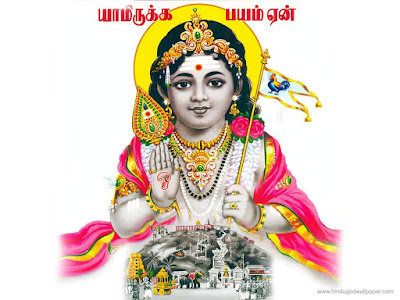காளைக் குமரேசன் எனக் கருதித்
தாளைப் பணியத் தவம் எய்தியவா
பாளைக் குழல் வள்ளி பதம் பணியும்
வேளைச் சுர பூபதி, மேருவையே (22)
kAlai kumarEsan ena karuthi
thAlai paniya thavam eithiyava
pAlai kuzhal valli padam paniyum
vElai sura bhoopathi meruvaiye! (22)
காளைக் - Built like a young bull
குமரேசன் - Lord Murugan
எனக் கருதித் - considered so
தாளைப் - Feet
பணியத் - Bow
தவம் - Penance
எய்தியவா - Achieve
பாளைக் குழல் - Thick black hair
வள்ளி - Mother Valli
பதம் - Feet
பணியும் - Bow
வேளைச் சுரபூபதி - Crimson colored Lord of Devas
மேருவையே - Like Meru Hill
Short Meaning
How fortunate am I, to perform penance on the feet of young and vibrant form of Lord Murugan, built like a bull?
The crimson colored Lord, famous like Mt Meru always bows to Mother Valli's feet
Gloss
Lord Murugan is addressed using three adjectives in the beginning
1. காளை - Bull
2. குமரன் - Son / Young One
3. ஈசன் - God
(குமரன் + ஈசன் = குமரேசன்)
Kumaran is one of the favorite names of the Lord. It indicates the eternal youth of Lord Murugan and also qualifies He is the son of Lord Shiva. The name Kumaran is also one of the favorite names of Sri Arunagiri. This name is also glorified in Verse 15.
The word ஈசன் (Isan) or Ishwara: or Maheshwara: is commonly used to refer Lord Shiva, as the Supreme God. However, in this case, it is used to refer Lord Murugan (who is non-different from Lord Shiva Himself)
In Thirumanthiram, verses 523 - 525 refer to the Atho Mukha Darshanam of Lord Shiva. Lord Shiva is commonly referred to as One having five faces:
1. Sathyojatham
2. Vamadevam
3. Aghoram
4. Tatpurusham
5. Ishanam
In Highest meditation of Yogis and Gods, Lord Shiva appears as One with 6 faces, which is rarest of rare forms, even for celestials. This face is downward facing Atho Mukham
With this, the five faced Shiva appears as six faced, Shanmukha which is exalted form of Lord Murugan / Sri Subrahmanya. This is indicated by this verse
(Thirumanthiram verse 523 [1])
523: The Downward-Looking Face is of Sadasiva
Inside Primal Fire that is Siva
Nandi rises in the centre, gleaming
He pervades worlds all,
His hue is of the twilight sun
Who the world in glory ambulates,
He is the Lord of the Downward-looking Face-- Athomukha.
The word காளை (Bull) is used to represent youthful exuberance of Lord Murugan
Sri Arunagiri says, he does penance (தவம்) to bow (பணியத்) to the feet (தாளைப்) of Lord Murugan.
The word penance can be roughly translated as 'austerities' - The penance one does by giving up on luxuries of life with sheer focus on reaching the Lord. Ramana Maharshi beautifully describes what actual tapas is:
If one attentively observes that from where what says ‘I, I’ goes out, there the mind will be dissolved; that alone is tapas [2]
If we understand that the Lord Murugan and our Self (which says 'I, I') are non-different, we'll understand that reaching Murugan and reaching Self are the same. And that's the Tapas indicated by Sri Arunagiri, at a higher level
In a devotional interpretation, Sri Arunagiri wants to reach the Lotus feet of Lord.
The next two lines of the verse bring out the extreme love Lord Murugan has towards his consort, Mother Valli
Mother Valli has thick, dark hair, compared to the bark of a betelnut tree, which is dark in nature. So, Mother Valli is referred to as பாளைக் குழல் வள்ளி
Lord Murugan has extreme love to Mother Valli - That, He always bows (பணியும்) to Her feet (பதம்) - This may sound outrageuous to some - But, Lord Murugan, in His extreme love to His consort, literally worships Mother Valli
Sri Arunagiri, then praises Lord Murugan as the Crimson hued Lord, who is Lord of Devas (சுர பூபதி) and immeasurable and great like Mt Meru (மேரு)
References
Images











